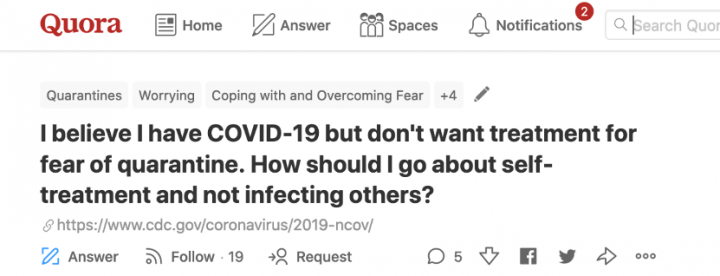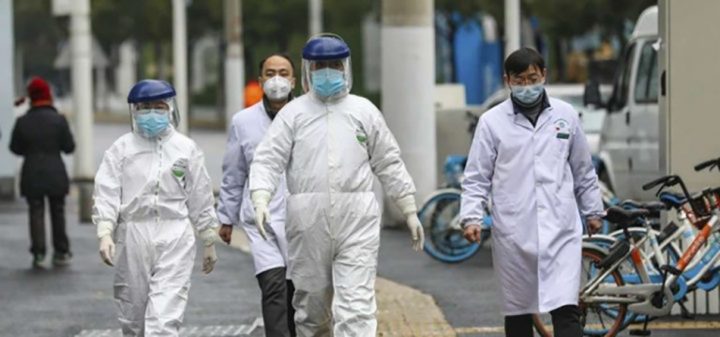Why would someone be afraid to be in quarantine? I asked myself as I read the following question in Quora.

But there are reasons to be afraid. First of all, the medical bills. The twenty-seven million uninsured Americans cause uncertainty to the ability of the government to control the Coronavirus pandemic in the United States.
Leaving aside the uninsured, let’s consider the privileged who paid private insurance. Of course, they may need to pay the full price of the testing and the treatment if they haven’t reached the annual deductible, according to Professor Nicholas Bagley, in an article by Julie Appleby in KHN.
Julie Appleby writes that “[e]ven after a deductible is satisfied, many plans also require some sort of copayment ― be it $10, $25 or more ― when seeing a doctor or going for a lab test. For emergency room visits, the cost sharing is higher.”
The other topic is sick leave. How would a family income be affected by at least fourteen days of quarantine? This may have a ripple effect. A person not able to work for a half month may not be able to pay the rent, buy the groceries, or pay the copayment for the medical prescription.
Eric Levitz writes for the Intelligencer:
More than 33 million Americans lack access to paid sick leave. About half of all service workers (among them, line cooks, and elder-care workers) cannot take a day off without losing pay. Meanwhile, thanks to our nation’s weak labor unions and at-will employment policies, many workers who do officially have paid leave are too afraid of repercussions to use it.
All of that may justify the fear.
Still, we’re left with those uninsured who had to bear a great loss of income. Would it be possible for an uninsured to forget about their medical bills and get tested? How likely would an undocumented person do it? They may not look for medical treatment. This is because some immigrants may be afraid to lose the possibility of adjusting their status if they ask for a public benefit. This is the result of the Trump’s draconian policies on the Public Charge rule. In New York, the undocumented can go to public hospitals and get emergency Medicaid, even possibly without any immigration problem. Still, people are afraid and may not take the risk.
What would be Trump’s administration’s response to the millions of uninsured? During a press conference last Wednesday, Mike Pence, the appointee to deal with Coronavirus pandemic, ignored the question made by one of the reporters.
This is a report of the exchange during the press conference taken from Democracy Now
Vice-president Pence walked out of the room and ignored at least twenty-seven million Americans.
Governor Andrew Cuomo took leadership by announcing last Wednesday that New Yorkers don’t have to pay any copayment or extra payment for any treatment related to Coronavirus and promised to amend the law to include paid sick leave. “Their employer should pay them for the period of quarantine, and their job should be protected,” he said.
But this is only in New York where even undocumented can go to the public hospitals. In other States, the situation is different for every uninsured, documented, or undocumented. “Now, what if you’re in [one of] the 14 states who chose not to expand Medicaid? Well, you’re in trouble, because their Medicaid levels are quite low,” said Elisabeth Benjamin, vice president of health initiatives at the Community Service Society of New York and co-founder of the Health Care for All New York campaign.
Even though we’re doing well in New York, what would happen during the next emergency? We don’t want to be unprepared. Elisabeth Benjamin said referring to Cuomo’s rules to combat the Coronavirus, “we need these things in place for the next epidemic and the next one after that. We need a health system that lets everybody who has symptoms go get the healthcare they need, and get the information they need to stop spreading the virus.”
Indeed, Coronavirus is just one of the examples in understanding that we need Medicare for All. “And maybe people — what people are learning from the coronavirus, that we do have to take care of the healthy American people together, we can’t do it one-off and one at a time — maybe that’ll help move the politics of the situation toward Medicare for All,” said Dr. Steffie Woolhandler, a primary care physician and the co-founder of Physicians for a National Health Program
Still without Medicare For All, some can take refuge inside their houses, wrap themselves in plastic bags, and pray that the Amazon‘s delivery boy has insurance, and has been properly tested. This is because going to the restaurant isn’t a choice!
With our low income workers lacking health insurance, not just in food service, but other industries, Coronavirus could be a nightmare here in the US. The Establishment policy of denying us health coverage is going to hurt them now and rightfully so. pic.twitter.com/VI4bUV5wuF
— William Franklin (@WillCFranklin) February 27, 2020
Jhon Sánchez: A Colombian Born, Mr. Sánchez, arrived in NYC seeking political asylum where he is now a lawyer. His short stories are available in Midway Journal, The Meadow, Newfound, Fiction on the Web, among others. In February, Teleport published his short story ‘Handy.’ The DeDramafi, was published on The Write Launch, and Storylandia will reprint it in issue 36. He was awarded the Horned Dorset Colony for 2018 and the Byrdcliffe Artist Residence Program for 2019. In 2021, New Lit Salon Press will publish his collection Enjoy Pleasurable Death and Other Stories that Will Kill You. For updates, please visit the Facebook page @WriterJhon






